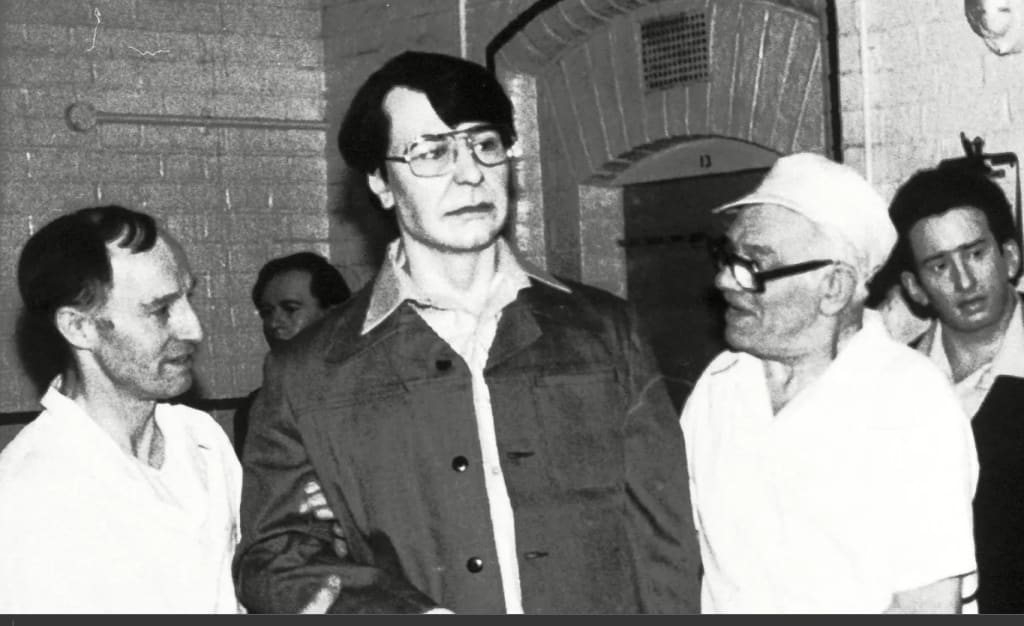The Grim Legacy of Dennis 'Des' Nilsen
A Haunting Tale of Murder and Mayhem

Dennis 'Des' Nilsen was a notorious Scottish serial killer who was active in London during the late 1970s and early 1980s. He was responsible for the deaths of at least 12 young men, and his preferred method of killing was strangulation. Nilsen would then dismember the bodies and dispose of them, sometimes by burning them in his garden or flushing body parts down the toilet.
Nilsen was born in Fraserburgh, Scotland in 1945. He had a difficult childhood and was known to be an introverted child who struggled to make friends. Nilsen's parents had a troubled relationship, and his mother was known to be emotionally distant. As a result, Nilsen turned to alcohol as a teenager and became a heavy drinker.
After leaving school, Nilsen joined the Army and served in Germany. It was during this time that he began to explore his homosexuality, and he had several relationships with other men. After leaving the Army, Nilsen worked as a civil servant and continued to drink heavily. In 1975, he moved to London and began working as a clerk at the Jobcentre.
Nilsen's first known victim was 14-year-old Stephen Holmes. Nilsen met Holmes at a pub in 1978 and invited him back to his flat for drinks. Nilsen later claimed that Holmes had tried to steal from him and that he had strangled him in self-defense. However, it is believed that Nilsen killed Holmes because he reminded him of his younger self.
Nilsen's second victim was 23-year-old Canadian student Kenneth Ockenden. Nilsen met Ockenden at a pub in 1979 and invited him back to his flat. He strangled Ockenden and kept his body in his flat for several weeks before disposing of it.
Over the next few years, Nilsen continued to kill young men and dispose of their bodies. He would often pick up men at gay bars or on the street and lure them back to his flat with promises of alcohol or sex. Once they were inside his flat, he would strangle them and then dispose of their bodies.
Nilsen's preferred method of disposal was to dismember the bodies and flush the body parts down the toilet. He would often keep the heads of his victims, which he would boil to remove the flesh and then keep as trophies. He also attempted to burn the bodies in his garden, but this was not always successful.
Nilsen's killing spree came to an end in 1983 when a drain outside his flat became blocked with human flesh. A plumber was called to fix the problem and discovered the remains of several bodies. Nilsen was arrested and charged with murder.
During his trial, Nilsen claimed that he could not remember killing his victims and that he had acted on impulse. He also claimed that he had attempted to revive some of his victims by giving them alcohol and placing them in his bed. However, the evidence against him was overwhelming, and he was found guilty of six counts of murder and two counts of attempted murder.
Nilsen was sentenced to life imprisonment and was initially sent to Wormwood Scrubs prison in London. However, he was later transferred to Full Sutton prison in Yorkshire, where he spent the rest of his life.
Nilsen's case is particularly disturbing because of the way he disposed of his victims' bodies. It is estimated that he killed at least 12 young men, but the exact number may never be known. Despite his notoriety, Nilsen's motivations for his crimes remain unclear, and his case continues to fascinate criminologists and psychologists.
One theory suggests that Nilsen's childhood and difficult relationship with his mother may have contributed to his violent behavior. Others have speculated that his alcoholism and repressed homosexuality may have played a role.
In interviews with psychologists and journalists, Nilsen has offered various explanations for his actions. At times, he has claimed that he killed his victims to keep them from leaving him. At other times, he has suggested that he was seeking companionship and that he had a deep desire to be loved.
Regardless of his motivations, Nilsen's crimes have had a profound impact on his victims' families and on the wider community. The families of his victims have had to live with the knowledge that their loved ones were killed in such a brutal and senseless way, and many of them continue to seek answers and closure to this day.
In addition to the impact on his victims' families, Nilsen's case has also had an impact on the way that the criminal justice system deals with serial killers. His case highlighted the importance of forensic evidence in solving complex murder cases, and it also led to a greater understanding of the psychology of serial killers.
Despite his notoriety, Nilsen remained an enigma to the end of his life. He continued to offer contradictory explanations for his actions and remained a controversial figure within the prison system. He died in prison in 2018, having spent more than 30 years behind bars.
In the years since Nilsen's crimes, there have been many other high-profile cases of serial killers, both in the UK and around the world. However, his case remains one of the most shocking and disturbing in recent memory, and it continues to serve as a cautionary tale of the dangers of unchecked violence and psychopathy.
In conclusion, Dennis 'Des' Nilsen was a notorious serial killer who killed at least 12 young men in London during the late 1970s and early 1980s. His preferred method of killing was strangulation, and he would often dismember his victims and dispose of their body parts down the toilet. His case highlighted the importance of forensic evidence in solving complex murder cases, and it also led to a greater understanding of the psychology of serial killers. Despite his notoriety, Nilsen remained an enigma to the end of his life, and his case continues to fascinate and disturb those who study it.
About the Creator
Rio Vijey
As a lifelong lover of storytelling, I am thrilled to begin my journey as a writer. I have a vivid imagination and a passion for exploring the depths of the human experience through fiction.
Enjoyed the story? Support the Creator.
Subscribe for free to receive all their stories in your feed. You could also pledge your support or give them a one-off tip, letting them know you appreciate their work.






Comments
There are no comments for this story
Be the first to respond and start the conversation.